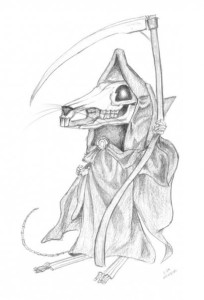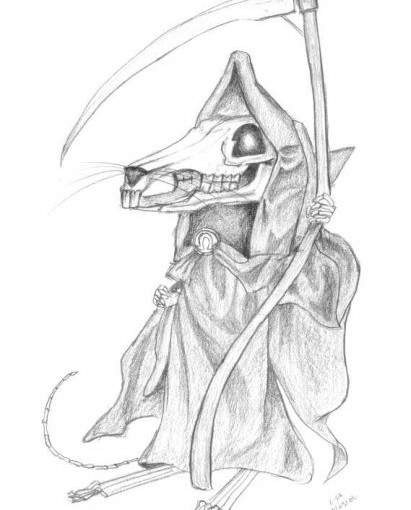 I remember swiping The Colour of Magic from my father’s library pile, at age 8 or 9. That was my first encounter with Sir Terry’s words, followed by the Witches books, Moving Pictures and Eric. Even my mother (never a fantasy reader) streamed with tears of laughter as we read choice passages to her. I was hooked long before I reached the City Watch and Death novels, where Vimes, Susan and Death himself became immediate favourites. Pratchett’s work only improved with time, despite his health struggles, leading to my personal favourite, Thud, and the well-loved Moist von Lipwig series.
I remember swiping The Colour of Magic from my father’s library pile, at age 8 or 9. That was my first encounter with Sir Terry’s words, followed by the Witches books, Moving Pictures and Eric. Even my mother (never a fantasy reader) streamed with tears of laughter as we read choice passages to her. I was hooked long before I reached the City Watch and Death novels, where Vimes, Susan and Death himself became immediate favourites. Pratchett’s work only improved with time, despite his health struggles, leading to my personal favourite, Thud, and the well-loved Moist von Lipwig series.
While I never had the chance to meet the man himself, Pratchett’s characters, his satirical eye and his prolific and consistent output have been inspirational. More importantly, his work was always, and primarily, entertaining. And that work will live on. It doesn’t dull the edge of loss, but it matters. Rest in peace, Sir Terry Pratchett.
The last post
Vimes could feel the cobblestones beneath his boots. And then he couldn’t. He opened his eyes. The street was indeed gone, as were the various targets of his protection and ire. A swirling fog filled his vision instead. The dwarves must have pierced a steam line again, although that didn’t explain the cobbles. Maybe… A figure strode through the mist, its joints clicking loudly.
“Oh,” he said. “Bugger.”
“AN APPROPRIATE TURN OF PHRASE,” said Death. “MAY I RECOMMEND ANOTHER?”
Vimes was rarely at a loss for words, but he hadn’t been expecting this. He had been expecting death, that is, for most of his life, but it had always been a little less personal. Or personable. He nodded.
“IT’S NOT MY TIME. PLEASE DON’T HURT ME. THINK OF THE CHILDREN.”
“Child.” Vimes corrected. “I only have the one.”
“AH. THINK OF THE CHILD.”
Vimes did. It was probably best that little Sam learned about death early on. Lady Sybil would have disagreed, he was certain, but this was one argument she wouldn’t win. He smiled at the thought.
“AHEM.” Said Death, after a minute. “WOULD YOU LIKE SOME MORE SUGGESTIONS?”
“No thank you, I think I’m ready.” Vimes replied.
“OH, IN SOME KIND OF HURRY, ARE WE?”
“Are you.” Vimes corrected again. A sloppy Death, after all. And he’d had such high hopes. He sighed.
“I’M SORRY?”
“Don’t be sorry, let’s just get on with it.”
Death blinked. There had been others, pushy individuals with little to lose, mostly. But this was a human with it all. A job. A house. A family. He even had a pair of boots.
“YOU WOULDN’T LIKE TO STAY?”
“I hadn’t realised that was on the table.” Vimes said.
“IT ISN’T.”
Vimes waited in silence.
“ANY LAST WORDS?”
“Oh, for…” Vimes stopped talking, because it’s hard to talk while grappling with an over-active skeleton for an over-sized scythe. He had intended to go peacefully, but intent doesn’t matter when a maniac swings an obsolete farming implement at a copper.
There was an OOMPH. And a THUD. Followed by a very subdued rattle as dozens of bones fell to the nonexistent ground and faded away.
“BUGGER.” Vimes said again.

